#Season 15 meta
Explore tagged Tumblr posts
Text
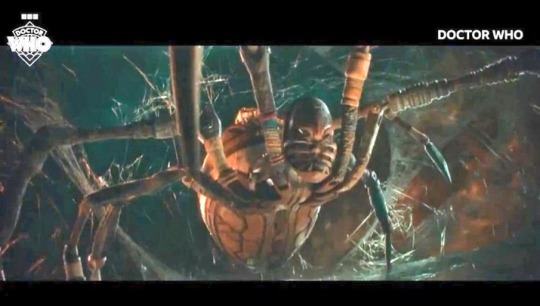
99.9% certain that this is going to be the Spider Anansi, the West African folklore character associated with storytelling and trickery

here, the Doctor is wearing African clothes, in a place that seems like it’s somewhere in Africa
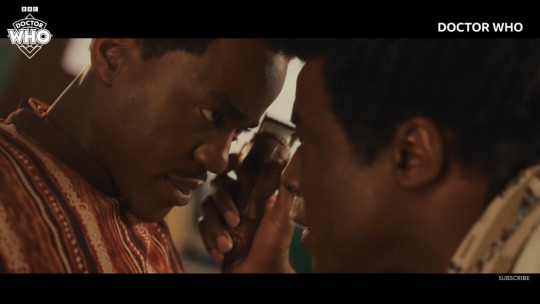
same episode; the man is saying to the Doctor “you need to tell a story”
#rope; weaving; web themes again. my favourite#the doctor-as-Loki; doctor-as-Anansi; Doctor-as-postmodern-narrator; as the storyteller and the story#God of stories innit. we can take Marvel and make it better#don’t disappoint PLEASE don’t disappoint#dw#doctor who meta#doctor who trailer#doctor who series 15#doctor who#fifteenth doctor#ncuti gatwa#african mythology#anansi#:)#doctor who season 2#language of rope
918 notes
·
View notes
Text
“Something always goes wrong”
“Yeah, why does that something always seem to be you?”
This but it means like, Dean could’ve ignored his sexuality if it wasn’t for Cas. Dean could’ve stayed in hell like he deserved if Cas hadn’t pulled him out. Dean wouldn’t have had to experience losing the love of his life time and time again if Cas just hadn’t come along.
#but Cas looks at him like he put the stars in the sky#do you know what that does to a self loathing person?#it’s a unique kind of hell#spn#destiel#supernatural#dean winchester#castiel#deancas#dean x cas#destiel meta#cas x dean#to be clear#dean deserving hell is what he thinks of himself#not what I think#Destiel thoughts#spn 15x03#dean meta#castiel x dean#spn season 15#the rupture
594 notes
·
View notes
Text
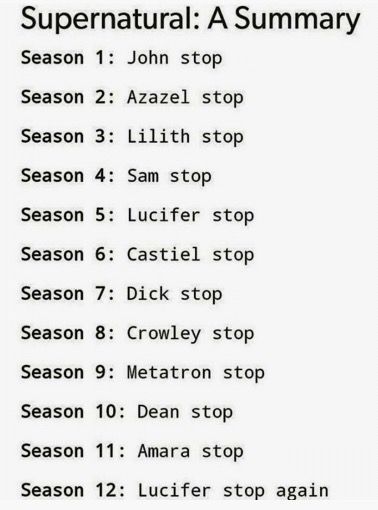
#supernatural memes#supernatural#castiel#spn#supernatural text post#supernatural fandom#dean winchester#crowley spn#movies#spnfandom#spn text post#sam and dean#casifer#obey me lucifer#sam winchester#supernatural script#supernatural meta#jack kline#spn memes#spn meta#Unfortunately this only goes up to season 12#supernatural family#supernatural tv show#rowena#the winchester brothers#castiel supernatural#spn villains#supernatural season 15
812 notes
·
View notes
Text
The Final 15 - Aziraphale’s Perspective
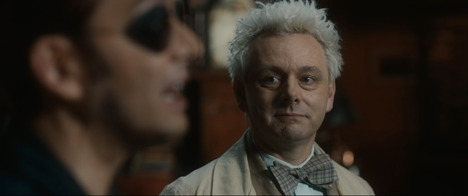
I see a lot of empathy for Crowley’s experience during the final 15 minutes of season 2 and it makes sense that we feel deeply for him. What he is experiencing is very human - acknowledging the depth of his own feelings, plucking up the courage to say something, having it come out all wrong, feeling utterly rejected, and then walking away in a mix of pain and anger. Who among us hasn’t been there?
But Aziraphale is experiencing something more complicated, something fewer of us have analogs for. Aziraphale has internally acknowledged his feelings for Crowley for some period of time, probably at least since 1941. Michael Sheen confirms this mental state in a NYCC 2018 interview:
“I decided early on that Aziraphale just loves Crowley. And that’s difficult for him because they are on opposite sides and he doesn’t agree with him on stuff. But it does really help as an actor to go, ‘My objective in this scene is to not show you how much I love you and just gaze longingly at you.’”
Unlike Crowley, Aziraphale’s struggle isn’t acknowledging his feelings. His struggle appears to be two-fold: 1) believing that Crowley could ever love him back and 2) even if Crowley did love him, believing a future for the two of them together could exist within the restrictions of his larger world view.
Can Crowley love?
Angels are, traditionally, beings of love. We see Aziraphale embody this time and again, showing kindness and support to almost everyone he meets, including the amnesiac Gabriel who has treated him abominably in the past. He is attuned to love, remarking on how the area around Tadfield “feels loved” twice in Season 1. As for how Aziraphale personally understands and expresses love, he shows his love to others through verbal affirmation and, to a lesser extent, physical touch. There are many examples of Aziraphale expressing his love for Crowley through positive verbal affirmation, typically by praising him for instances where he has been kind, nice, or good. And on the rare occasions when Aziraphale receives verbal praise, he absolutely interprets it as an expression of love, blossoming with happiness.
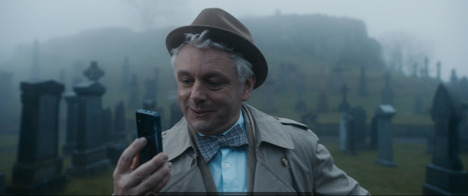
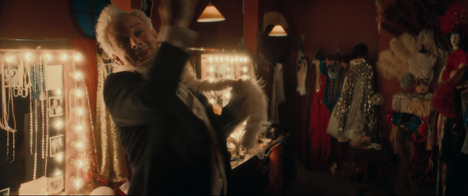
But from Aziraphale’s perspective, it may be unclear if Crowley can feel love in the same way. Can demons love? Did he lose that capability when he fell? Crowley can’t feel the aura of love in Tadfield that Aziraphale remarks on, and his reactions to Aziraphale’s praise are always to shrug it off, tell Aziraphale to “shut up,” or in the most extreme case to physically slam him against a wall and get in his face about it. In this last instance he tells Aziraphale, “I’m a demon, I’m not nice. I'm never nice. Nice is a four-letter word.” A four-letter word, like love, that is not in Crowley’s self-defined vocabulary.
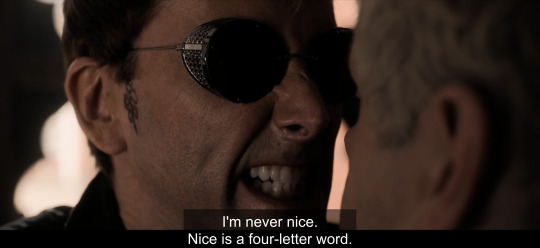
If Crowley can feel love, does he love Aziraphale?
Even if Aziraphale believes Crowley is capable of feeling love, he does not always recognize how Crowley expresses it in the moment. Crowley shows his love for Aziraphale through actions, but Aziraphale often misconstrues Crowley’s motivations. In 1793 when Crowley rescues him from the Bastille, Aziraphale initially assumes Crowley is only there because he is responsible for the Reign of Terror. Similarly, in 1941, Aziraphale’s reaction to Crowley’s appearance is to assume he’s just part of the Nazi gang, saying,“I should have known. Of course. These people are working for you!”
Crowley doesn’t help matters in this regard because he is constantly muting and undercutting his signals to Aziraphale. Every time Crowley expresses his love for Aziraphale through actions - rescuing him, saving his books, even taking him to lunch - he does so in a nonchalant, dismissive manner, indicating he ascribes little value or importance to the actions he has performed. “I just didn’t want to see you embarrassed,” he says when he appears in 1941. And when Aziraphale positively glows with happiness about his books being saved, Crowley tells him to “shut up."On top of these confusing signals, Crowley is almost pathologically incapable of expressing his feelings in the verbal love language that Aziraphale can understand. This is heartbreakingly demonstrated in this scene after the bookshop fire:
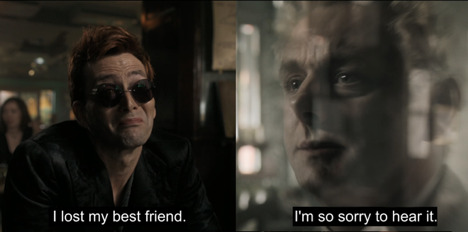
Crowley can’t even say “I lost you.” Instead he speaks of Aziraphale in the third person while sitting in front of him, saying, “I lost my best friend.” The little hitch on Aziraphale’s face when he hears this is just devastating. Who is Crowley talking about? The last conversation they had before this scene was when Aziraphale called while Hastur was in Crowley’s apartment and Crowley said, “Not a good time - got an old friend here.” Aziraphale is left to wonder - is that who Crowley means when he says "best friend?" Crowley is everything to Aziraphale, but what is he to Crowley?
How Would It Even Work?
Even when Aziraphale does get flashes of the possibility that Crowley may care for him he immediately runs up against his second mental block - there is no world he can imagine where they could be together. When Crowley first suggests running off together in the bandstand scene in S1E3, Aziraphale collapses under the thought: “Friends? We aren’t friends. We are an angel and a demon. We have nothing whatsoever in common. I don’t even like you.”
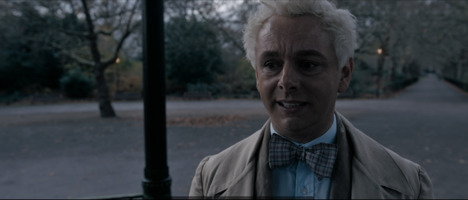
While he is obviously in denial, Aziraphale is also under tremendous stress in this moment and is desperately trying to hold onto some stability by falling back onto his world view and ideology. In this state he backpedals all the way to “I don’t even like you.” In his understanding of the way the universe is supposed to work, he and Crowley are hereditary enemies and should not even be friends, much less in love. Aziraphale expresses this core belief throughout the series. What kind of existence could they ever have together in reality?
The Final 15
With this as a background, we can better understand what Aziraphale experiences in the final 15 minutes. Even before the Metatron enters the scene, Aziraphale begins to have his fundamental beliefs challenged which puts him off his footing. The revelation that Gabriel and Beelzebub are in love is deeply impactful. When Beelzebub says “I just found something that mattered more to me than choosing sides” and takes Gabriel’s hand, Aziraphale immediately reaches out to make contact with Crowley, a look of incredulity on his face. Here is proof that demons can feel love and that an angel and a demon can carve out a space together. The road may be difficult, but it is not impossible.
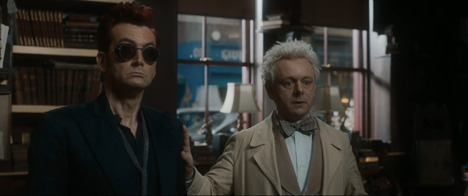
Before Aziraphale can digest this revelation the stakes are ratcheted up: Michael threatens to erase Aziraphale from the Book of Life due to his part in hiding Gabriel. The future that Aziraphale has just barely glimpsed is already under siege. It is at this point that The Metatron enters, offering Aziraphale not just survival and protection, but a version of everything he has ever wanted.
If Crowley is reinstated as an angel, Aziraphale will no longer have to wonder whether Crowley is capable of feeling love. And if they are both angels, there will be no conflict inherent in having a life together. In one fell swoop, the Metatron entices Aziraphale with a future where there are no remaining blockers to an eternal, loving existence with Crowley. It will be “like the old times, only even nicer” because they now have millennia of their shared history to build on together. Of course this logic is horribly flawed and does not take into account at all what Crowley wants, but in the moment it must feel like an enormous gift to Aziraphale.
Unfortunately, not only is Crowley’s reaction to this “incredibly good news” not what Aziraphale expects, the conversation quickly takes a baffling turn for him. Crowley shuts down the talk about returning to heaven and attempts to say what he wants to say. Sadly he once again utterly fails to speak in a way that Aziraphale can understand.
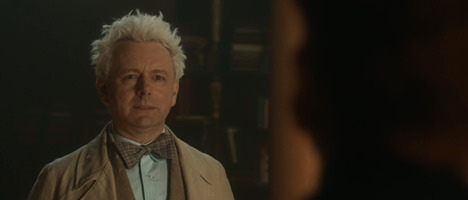
The audience knows what Crowley is trying to say because we have the context of his earlier conversation with Maggie and Nina. But Aziraphale lacks that and thus can’t understand where this is coming from or what it means. Rather than expressing his feelings as Beelzebub and Gabriel did, Crowley recites facts: we’ve known each other a long time, we’ve been on this planet a long time, I could always rely on you, you could always rely on me. He can’t even say the word “couple” when he describes them, referring to them more as colleagues with words like “team” and “group.” And the one time he does try to express his feelings and desires he is physically unable to get out the words: “And I would like to spend—.” He then retreats into his old plea to turn away from heaven and hell and run off together. Nowhere in Crowley’s confession does Aziraphale hear “I love you” or even “I want to be with you.” What he hears instead is what he’s heard multiple times before - Crowley wants to abandon both heaven and hell and default to just the two of them. From Aziraphale’s perspective this will not solve anything for them. They will still be an angel and a demon, at some level fundamentally separated by their very natures.
Having failed in his speech, Crowley then does two things in rapid succession that must be excruciatingly painful for Aziraphale. First, he does the opposite of verbal affirmation by calling Aziraphale an idiot. We have seen Aziraphale become physically radiant in the rare instances where Crowley has praised him, so a direct insult like this must feel poisonous. Then Crowley makes a last desperate attempt to communicate through Aziraphale’s other love language - physical touch - by initiating the kiss. But without context or understanding of what is behind it, Aziraphale can initially only experience it as forceful, angry, and shocking. With more time to parse it I think Aziraphale will come to understand Crowley’s meaning, but in the moment it must feel manipulative and borderline cruel.
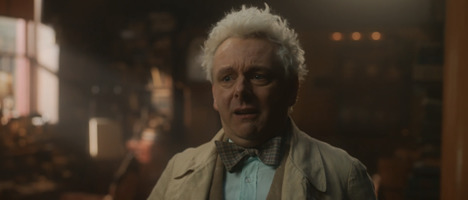
The Results
In a very compressed time frame, Aziraphale has to move quickly and radically through multiple mental and emotional states. For 6000 years he has believed he and Crowley cannot be together. Suddenly, with the revelation of Gabriel and Beezlebub, that foundational belief is challenged. Before he can work through what that could mean for him and Crowley, the Metatron offers an even cleaner solution - they can be protected from retribution and be on the same side again. When Crowley rejects reinstatement wholesale, it makes Aziraphale feel that he and his loving offer of a life together have been personally rejected. Then that rejection is further confused through the shocking experience of the kiss which Aziraphale does not have adequate context for or time to understand and integrate. In his emotional turmoil, Aziraphale falls back on his default crutch for dealing with sadness and anger - forgiveness - which further cuts him off from Crowley. Taken all together, this is a tumultuous rollercoaster of whiplash emotions that pull at every part of Aziraphale's self- and world-views.
Compared to what Crowley is going through, I think Aziraphale is going to have the tougher road in Season 3. Crowley may still need to better reconcile and integrate his feelings for Aziraphale, but Aziraphale has 6000 years of foundational ideology to challenge and evolve to reach a place where he and Crowley can be together as their authentic selves.
#good omens#aziraphale#crowley#aziracrow#ineffable husbands#good omens meta#good omens 2#gomens#essay#final 15#crowly x aziraphale#good omens s2#good omens season 2
1K notes
·
View notes
Text
March 9th

Dark Side of the Moon (5.16) Carry On (15.20)
Hold on, I don't remember Castiel helping Dean leave Heaven in DSotM. I remember Castiel helping Dean with something far more important than that:
DEAN: I’m dead. CASTIEL: (on radio) Condolences. DEAN: Where am I? CASTIEL: (on radio) Heaven. DEAN: Heaven? How did I get to heaven? CASTIEL: (on radio) Please, listen. This spell, this connection, it’s difficult to maintain. DEAN: Wait. If I’m in heaven, then where’s Sam? CASTIEL: (on radio) What do you see? DEAN: What do you mean ‘what do I see’? CASTIEL: (on radio) Some people see a tunnel or a river. What do you see? DEAN: Nothing. My dash. I’m in my car. I’m on a road. CASTIEL: (on radio) Alright. A road. For you it’s a road. Follow it, Dean. You’ll find Sam. (The radio is breaking up.) Follow the road. (The radio dies.)
Even Castiel knew what Dean's main focus ALWAYS was.
AND that was still true in the finale.
Once again, Dean didn't want to leave Heaven, he wanted to get to SAM. Or waste time until SAM showed up.
#supernatural#destiehellers#destiew#dean isn't bi#bad heller meta#dark side of the moon#spn 5.16#spn 5x16#season 5#carry on#spn 15.20#spn 15x20#season 15
95 notes
·
View notes
Text
It's insane how Atomic Monsters is about parents protecting their child and refusing to let go until learning that it's for the better and most importantly that they have to respect their child's wish. And then parallel to it you have Chuck mocking Becky, refusing to let his characters be free, and being the absolute opposite of the parents who actually love their child and accept their child's agency... yeah, that's the good stuff
#thoughts#spn 15x04#spn#supernatural#cannot believe I am making posts about this in 2024#spn meta#I guess#meta#season 15#s15e04
327 notes
·
View notes
Text
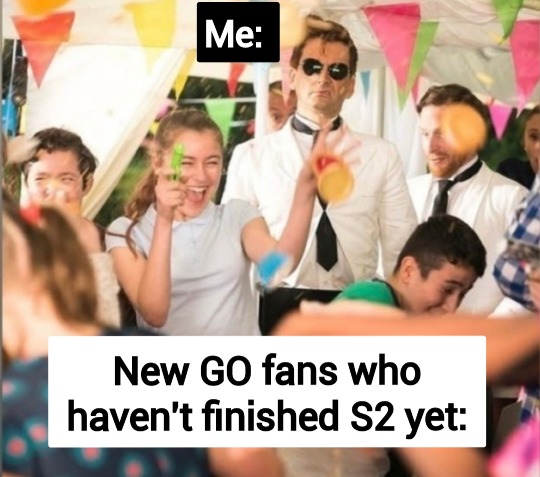
#i'm joking#i actually love seeing people enjoying themselves#while they can#but I'm also a little bit jealous#i miss the person i was before the final15#she was happier#she thought she was getting a happy ending#now she's on tumblr posting metas#and reading fanfics on ao3#a tragedy#except she was reading fanfics before too#good omens#good omens season 2#final 15#the final fifteen#aziraphale#crowley#ineffable husbands#aziracrow
100 notes
·
View notes
Text
I am absolutely incorporating the "Moon and the President's wife poem" into my understanding of the Doctor and the Master btw.
I went down to the beach and there she stood. Dark and tall at the edge of the woods.
"The sky's too big, I'm scared," I cried.
She replied "Young man, don't you know there's more to life than the Moon and the President's wife?"
I cant help but read it as a snippet of a conversation. The Doctor and Master talking after the incident with the Moon and the President's wife daughter. Both still on Gallifrey. Both rebels, causing so much trouble but not yet taking the step to leave.
The sky is too big. The universe too wide. I'm scared to leave. The young man on the beach, clearly the Doctor. Young and afraid, the boy who ran away from what he saw in the Schism. Who wants adventure but had stayed content to mess around with Presidents daughters. Who needed a push to steal that Tardis and run away.
Then the other. On the edge of the woods, already on the cusp of the unknown (Woods are always an adventure in stories). One foot already out the door. A dark and tall figure, telling the one on the beach to just come on. Don't you know there is more to life than the Moon and the President's wife?
The Master, abstracted through the story as Missy. The one who lied about who he stole. The figure who stood in the woods, and who fell in the woods. Just on the cusp of everything.
A promise to run, there's so much more, lets find out what lies in that big sky.
A promise that was never acted on.
A series of events abstracted through layers of fiction, shabogan rumour, and fairytale. A story that helped the Doctor calm down right before death, twice. When nothing else could.
Even now after everything, being saved and kept alive by thoughts of the Master.
I cannot and will not ever shut up about it.
#there so many other interpretations here BUT I WILL ALWAYS HAVE BEST ENEMIES ON THE BRAIN#doctor who#dw spoilers#thoschei#best enemies#doctor/master#the moon and the president's wife#season 15#series 15#STEVEN MOFFAT I COULD KISS YOU#boom#dw meta#spoilers#dw#the doctor#missy#the mistress#the master
179 notes
·
View notes
Text
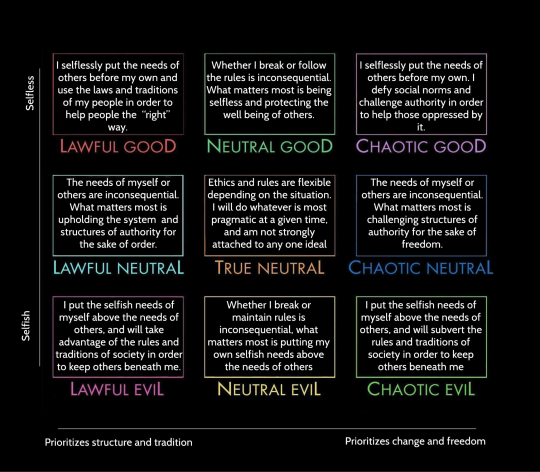

I made a thing! Sylvie's is slightly off since she does care about her needs, but it's pretty close.
#loki#mobius#lokius#loki season 2#loki series#loki meta#my meta#sylvie#ob#ouroboros#brad wolfe#x-5#b 15#verity willis#ravonna renslayer#hwr#he who remains#kang#general dox#miss minutes#dnd alignments#dnd
296 notes
·
View notes
Text
Holy Shit This is gonna be a good season 2 for doctor who
youtube
#doctor who#dr who#doctor who season 2#nuwho#ncuti gatwa#fifteenth doctor#ruby sunday#15th doctor#millie gibson#belinda chandra#doctor who spoilers#doctor who series 1#doctor who meta#doctor who the giggle#doctor who series 15#tenth doctor#new who#Youtube
25 notes
·
View notes
Text
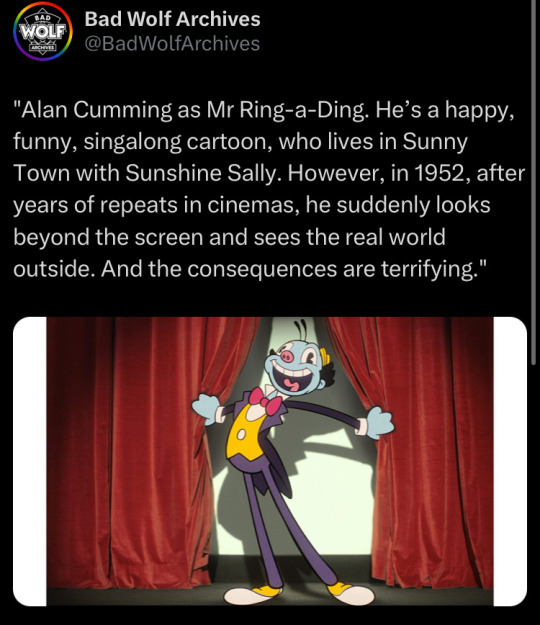
looks like the now-infamous Stuck Inside A TV Show theory is back on the menu, boys
#dw#doctor who series 15#doctor who season 2#doctor who#fifteen#fifteenth doctor#russell t davies#doctor who meta#ivy.txt
437 notes
·
View notes
Text
easily the funniest thing restoration did though was hand us a perfect explanation for why it isnt canon. like oh, epsilon ran hundreds of simulations before he destroyed himself, and even he doesnt know if this one is real or not? well then, obviously. it isnt real. you would know how easy it is to write something off as not canon, wouldnt you? uno reverse motherfucker, i do not accept your fanfiction as canon. this was clearly a simulation and not even a good one
#i enjoyed it and im excited to see more fan content of meta!tucker but i do not accept this as canon. its like a spinoff miniseries to me#like season 15 is bad but at least it fucking understood grimmons. jesus christ. ill take that over this any day#rvb#rvb spoilers#rvb restoration#rvb19#biggie tumbles
107 notes
·
View notes
Text
another tally on the “things about jack that have been almost erased by the baby au” is how genuinely fucked up and weird and scary and violent and horrifying he is. the body horror of his existence is so. Palpable.
he looks human, but he still fundamentally is not human, and the thing that separates him from being human or belonging or being normal and loved and accepted without strings attached is his own bloodline. his own family, his own father. the blood that runs through his veins is the blood of the devil and he wasn’t fed it like Sam. the anger and rage and capacity for violence inside him isn’t an ancient curse like it was for Dean. It’s just who he is. It’s his neurology. Jack enters a guilt/grief-induced psychosis so bad he starts hallucinating his own dead evil father who proceeds to say “I’m in your head, your DNA,” and goes on about how Jack’s place with the only chosen family he ever cared for is that of their little pet monster who’s only kept around to kill things for them. And this is his subconscious, remember, these are all Jack’s own thoughts being given a hallucinatory voice.
When jack is first born he doesn’t even register that he’s not a full human. It’s not until he catches dean telling the sheriff that he’s a Nephil and gets stabbed all the way through his entire heart to the hilt of the angel blade and survives, that he realizes he’s Not Normal. Jack stabs himself 18 times with “grim determination,” dedicated to making a wound stay open in his body, but nothing happens. He doesn’t know what any of this is, but he knows it’s dangerous and he’s seen firsthand what he can do, because he sent the sheriff careening backwards into glass when he didn’t mean to do anything more than push her away. He tells Dean he will hurt someone again [whether he means to or not]. And he tells Sam, using his powers is like breathing; it’s a subconscious, physical, neurological part of his system that he cannot (currently) consciously control or stop.
He’s literally a living weapon. These powers of his that hurt people are akin to breathing. His violence and his evil is deep seated and runs through his heart and bleeds out of him. But he can’t bleed the evil out. He can’t escape what he was born into or what keeps him alive. He can’t even live without this nuclear power that ostensibly others him from everyone forever. He’s foaming at the mouth and seizing and fainting and bleeding and going into total systemic failure and subsequently dying as a human because he just isn’t human and he can’t live as one even if he wants to, even if that is a part of him it still isn’t the only part of him. The other half that makes him untrustworthy and violent and angry and dangerous and nuclear and evil and feared and hated is the one part he is left dying without.
His body dies a first time because it couldn’t live without its own hereditary disease, he died as a human and goes to human heaven and sees and rekindles with his human mother, the part of him that he wants to be and loves but can’t exist as. He’s brought back but now he’s a time bomb, a nuclear reactor internally melting down. he’s a weapon, but he’s alive because he was born as a weapon, and neither of these things were his choice.
and then a second time his body dies because he was only registered as a threat with no humanity. his eyes are burned out of his skull and instead of heaven with his mother, instead of humanity, he wakes up in the pitch black abyss where other nonhumans go when they die, then he’s brought back and he’s a weapon for the third time. He’s a living bomb, a collapsing black hole, and he has to eat human hearts ripped straight from the chest to keep his bomb body alive and ready for detonation, ready for collapse. He’s so far from human, further than he ever wanted to be, further enough to make his deep rooted fear a reality that he’s too suicidal to bother rebuking. Why rebuke the truth? The absolute truth that the devil, the evil of all things is in his blood and he is evil and he was a born weapon whose body exists to destroy and kill and not even his own love or will can stop it.
He is a gun that doesn’t want to be a gun and hates that his body is made to shoot and kill, but he has no choice in being anything else but a gun. He cannot ever be good, he was never good to begin with, he was just malfunctioning, glitching, experiencing an error and virus and flaw that he wishes was his entire programming. His eyes glow yellow like the corrupted Star Wars Sith and Rosemary’s Baby and a whole slew of evil things that are evil and meant to be rejected. When he gets angry, people stare at him as if he’s a cornered animal, because that’s what he is to them. To both sides of the equation, he is an animal. A foreign creature, a thing, he’s not human enough to be human and he’s not angelic enough to be an Angel. He’s some weird mixture that nobody can understand or accept. He’s unpredictable and violent and wild and born that way and only in his subsequent domestication, only in the extension of personhood and humanity can he be deemed worth loving. He’s like a dog, detrimentally loyal, old yeller going rabid while saving his family and having to be shot in an act of mercy. Barking and biting at people who might hurt his loved ones and killing them as an act of love. Sam wanted Nick to burn so Jack burns Nick and that’s why Jack says they would be grateful. He did what Sam wanted. Same for the other biblical killings. He’s the cat sinking its fangs into rodents and birds. Leaving the punctured corpses on the doormat as a gift, I did this for you because I love you, don’t you love me too?
I haven’t eaten well in the past two days does this click click anyone’s boom. Saliva
#spn#supernatural#spn meta#spn analysis#jack kline#jack spn#jack supernatural#animal motifs#dog motif#cat motif#sam winchester#dean winchester#castiel#team free will 2.0#tfw2.0#spn 14x17#spn season 15#spn 13x01#grips you by the shoulder sdoes this make a modicum of sense#I don’t have any more good tags I think#wincest dni btw. this is Not for you#kelly kline#spn lucifer#euggh. it’s almost 4am I’m hungry sorry#goodnight#jack meta#to find later#<-BECAUSE I KEEP FUCKING LOSING IT
367 notes
·
View notes
Text
you know what would be so meta and funny (to me at least)
if in pac-man fever when charlie tells sam and dean that she read the supernatural books she also said she read fan forums and that apparently a lot of the audience really dislikes sam lmao. he’s already one of the most tragic characters ever for his treatment in universe (which i love) and out of universe (which i hate). let’s just amp it up because there’s no winning for him anyway
imagine if sam knew that the audience prefers dean and even supports his abuse of sam because dean is ultimately always viewed to be in the right. on top of knowing that the prophet/later-revealed-to-be-god chuck that literally wrote the story of their lives is unsympathetic to him and also prefers dean. for good measure, i want to rewrite the french mistake and have the writers giggle about how they’re going to torture sam next because they and the audience think he deserves it. and make it so au jared knows about it too. let sam be repeatedly and mercilessly brutalized to an extremely comical degree because it’s entertaining to everyone in and out of universe. but he’s aware of this now and yet he still remains kind-hearted through it all because that’s what makes it so ludicrous and fun. make him think “it can’t get any worse than this” but it absolutely does.
keep the momentum of sam wanting nothing but to be good but have everyone else always treat him like he’s the problem. turn the truman show into the sam show. have single episode side characters break the fourth wall because their hate for sam is so strong just by being around him. make it extremely obvious that sam does nothing to warrant this and that he’s being gaslit in and out of universe. he can be aware of how strange this all is and wonder if he’s actually insane but the scene needs to change quickly so he doesn’t have time to fully deal with it because hurry sam there’s more pressing matters!! have him try to bring it up to other characters but they immediately change the subject until sam lets it go
have it be a social experiment, write dean to be even worse than he already his, more psychopathic super villain, see how far it can go before people turn on him (we all know they won’t). in each episode near the end have sam begin to truly realize that he needs to escape, but have him die a random death like in mystery spot which resets him for the next episode. the audience can even vote for what it will be each time. it’s cathartic for them. dean lets this happen because he needs his sammy to stay with him. keep the ending the same. sam marries his blurry wife and names his son dean jr. then sam joins his abuser in heaven for all eternity. don’t ever let him be free.
azazel’s actor about sam
#i understand how triggering this would be#but it’s interesting to speculate#sam winchester#sam winchester meta#supernatural#tw gaslighting#tw abuse#it would be so traumatizing to jared#imagine going through that for 15 years#i mean#worse than it already is#he would quit and they’d replace him#and they’d have to replace the actor for sam every season because they can’t take it anymore#ficlet
44 notes
·
View notes
Text
March 17th

Carry On (15.20)
And what point would it be to just have Cass there? To have him smile at Dean 🤣🤣🤣 who would STILL only have eyes for SAM. **cough** third wheel **cough**
Of course, the finale is Jensen's fault. LMAO, this heller really thinks there are only TWELVE bibros?
But at least they understand that THE GEN AUDIENCE doesn't care about destiel. Too bad, they DON'T understand that the show is FOR the gen audience NOT "the rest of us".
21 notes
·
View notes
Text
In The Eyes of God
Castiel x Dean (Destiel, Fantasy AU) 💚💙
Word Count: 2,117
Cas and Dean are forbidden lovers, prince x peasant, religous masterbation. PART ONE! Lore building/introductions
Part two: https://www.tumblr.com/q1mblrrd/771356815841804288/in-the-eyes-of-god?source=share
Warnings: masterbation, self hatred, insecurity, forbidden love (homophobia), hinted abusive relationships (familial)
ـــــــــــــــــﮩ٨ـ ﮩ٨ـ
Castiel shut the rickety wooden door behind himself, the hinges squealing loudly due to rust from lack of use. He cursed, hopping down onto the soft dirt and quietly listening to make sure nobody had heard the door shut. His Father would have his head on a stick if he got caught sneaking out again. Pulling his cloak shut at the next gust of wind, he determined it was safe to continue and headed off toward the distant treeline. The forest behind the castle was the only time Castiel found himself able to be free, the only time he truly had any privacy. His quarters were too lavish, the servants too… servant-y. He didn’t like being born a member of the royal family, not when the whole world out there was his to explore.
Especially not when everyone in the village survived in poor conditions. Why was Castiel any different from them? They were human too, were they not? The heartless, cold corridors of this castle haunted him. The stones and gems and lush carpets, the silk and heavy fabrics that kept him warm, part of him despised it all. He hated his Father most of all, the man who kept him caged here. His Mother was powerless, everyone knew it even if none would confess it. He knew instinctively he was betraying some deep part of himself by longing for a different life. It felt wrong to wish suffering upon his life, but that was the only thing that ever truly felt right.
He pushed these thoughts aside, marching up through the mud and checking over his shoulder every now and then to ensure he wasn’t being followed. The rain a few days before made everything smell like damp Earth, and he loved it. It was hard to resist smiling softly, crouching down to silently admire the small flowers that pushed their way up through the mud. As gently as he could he ran a finger over a tiny petal, taking in a deep breath and shutting his eyes to listen to the leaves rustling in the wind, feel the feeling of the world around him. Yes, this was where he belonged. Not shoved into a cold room, meeting with young women he was supposed to marry.
“I don’t think you’re allowed out this far, sir.”
Castiel opened his eyes, standing and turning at the sound of a new voice. A young man on a large horse stood a few feet away, watching Castiel with a neutral expression. He had short-cut brown hair, a fair complexion aside from slight stubble, and what Castiel could only hope was just dirt on his face and clothes. His eyes though, caught the light. A stunning green, one that reminded Castiel of the forest he loved so much.
“I suppose you’re right.” Castiel gave a small nod, adjusting so he didn’t start to sink too far into the mud. “Has my Father sent you?” The other man shook his head. So far he was silent, which was confusing. This expression showed on his face as he asked his next question, crossing his arms over his chest. “Are you mute?”
“No.”
“Then who are you?”
The man chuckled a little, leaning forward on his horse.
“You’re a bit demanding, are you not? I would’ve thought they’d teach you better manners in a place like this.”
Castiel was only further perplexed, scoffing and dropping his arms since he didn’t know what else to do with them.
“It’s a fair question to ask. What would you like me to call you?”
“Dean.” There was a small pause and Castiel nodded. “Dean, then.” Dean himself also gave a nod, somewhat of a bow, although he wasn’t too fond of royalty and found the whole idea to be quite ridiculous. Castiel hadn’t expected anything less, and to an extent, he respected the decision. Dean had a certain strength he didn’t, and for that quality Castiel would probably always admire him.
“Would you like a ride back to the castle?” Dean spoke up after a few moments, watching as Castiel shook his head and turned, heading deeper into the forest. “No, that’s alright. I can walk just fine.”
”I think you’ve got your sense of direction a bit mixed there, sir. Castle’s the other way.” Castiel bit back an irritated sigh, glancing over his shoulder to watch as the other followed him on his horse with a bit of a smug look. It annoyed him. “I know where I’m going. You can attend to your duties, you needn’t follow me.”
“Oh, I needn’t?”
”No. You needn’t.”
Castiel turned heel, giving the other a sharp look, still forever perplexed when he just smiled back. Why was he so.. annoying, yes. Too annoying, annoying enough his collar felt a bit too tight and now the breeze didn’t seem cold enough. He huffed, marching up a steep incline, slipping a few times on the slick ground, ignoring the heat on his cheeks.
“I wouldn’t recommend that, you’ll fall face-first into the mud.”
Dean continued following the other on his horse, now mostly because he was intrigued by this Prince’s perseverance and stubbornness. “I’ll be just fine, thank you very much.” Castiel couldn’t finish his thought, tripping over a tree root when he turned to give the other a small glare. Dean stifled his laugh as the royal scrambled to push himself up, wiping away dirt from his face and clothes. Castiel huffed, turning and stamping a foot into the ground. “Now look what you’ve done!”
”I haven’t done a thing,”
”Yes you have, you’ve distracted me and now I’m covered in mud!”
”I believe that was entirely your own doing, sir, I did warn you.”
”Oh shut up, I’ve heard enough of your stupid voice.”
Castiel turned away with an aggravated groan, Dean chuckled to himself and rested against his horse’s mane, waiting a few moments to let the other boy sort out his very big feelings before speaking again. He truly tried his best not to sound demeaning.
“Would you like a ride back to the castle?”
A heavy sigh of defeat. Castiel didn’t speak, but he walked around and swatted Dean’s hand away when he offered to help him up. After a bit of struggle, he pulled himself onto the horse, resting his hands in his lap. Dean cast an eye over his shoulder, taking the reins in both hands now.
“I think it’d be good to hold on if I were you. You’ve already got enough mud.”
”I'll be just fine.” Dean watched him for a few more moments before shrugging and looking forward again, taking a breath. “Your choice, sir.” He set the horse off at a nice trot, lurching them forward and nearly casting Castiel off the side of the animal before instinctively he grabbed Dean's waist, hugging against his back and making sure to hold on. As much as he tried to be stubborn, it seemed Dean always ended up the winner. They’d only just met and still Castiel was confused, warmth in his chest clashing with the annoyance in his head at the other’s smugness. Why did he have to be so charming, yet such an ass?
Dean was in a different state of mind, curious about the other. It wasn’t every day he met a Prince after all, and certainly not a common occurrence for him to be able to tease one like so. Castiel didn’t seem to be against it, so Dean enjoyed it. He liked the other’s eyes, glancing over his shoulder now and then to get a peek at them. They were so bright and deep, layers of blue, hints of gray. It reminded him of the sea, of the oceanside, and of his home. He missed the way the water would crash against his ankles, the foam pooling in the sand, and the feel of warm rays of sunshine against the bitter wind from off the coast. When he looked into Castiel’s eyes, he felt as though he was there again, standing on the beach, home. He was at peace in those eyes, something he didn’t feel often these days. Despite this, he took the other back as promised.
This didn’t stop Castiel from going on his outings to the forest, and more often than not he would find Dean somewhere along the path. They grew closer, learning small details about each other, taking more rides to and from the castle, and even Castiel helping in the stables. This was hidden from everyone since it would be frowned upon greatly if they were ever discovered. Castiel wasn’t meant to be around the likes of Dean, and Dean wasn’t even meant to be speaking to the other, much less offering him rides on his horse and having him anywhere near the stables. Despite the dangers, they went out of their way to see each other. It was just a friendship, a strong one, one that made them jump hoops to ensure they’d be safely tucked away out of sight, but only a friendship. That’s what they assure themselves when they lay awake in their beds at night, staring at the ceiling and wondering what it might be like to have the other’s warmth lying next to them. Dean wondered what it might be like when he slept on hay in the stables, but the danger of knowing what he might do to Castiel was too much, and it held his words in his throat when they were together. It was forbidden in more ways than one.
He wasn’t meant to feel this for another man, not for the Prince. He wasn’t meant to feel much of anything, he was just a stable boy. He shoveled shit and he took the backhanded slaps when he made a mistake and he never spoke a word to anyone he was meant to respect. He wasn’t supposed to be friends with the Prince of the kingdom, and even more so he wasn’t supposed to be in love with him. The thought kept him on his knees in the church far past when all the others had gone, it kept him there until he was bruised and barren, starving for an answer. An answer never came, just a building sense of longing whenever he got a glimpse of those deep blue eyes. Why? Dean hated himself for the way he was, and for the way the only person who could make him feel better was the very person he wasn’t allowed to have.
Castiel was restless, tossing and turning, staring out the window of his chambers, pressing his hands against the cold frosted glass when he felt like he couldn’t think. When he woke up sweating, dizzy with blood rushing to his head and his dick, making it impossible to do anything but lay there in misery. He refused to give in, even though he wished he could. Castiel would give anything to feel those lips on his, the way Dean’s stubble would scratch his cheeks, the way those rough hands would be so gentle. He dug the heels of his palms into his eyes, panting and trying to force it away. Why would God torture him with desire for something he knew he couldn’t have? It dragged him from his sheets and to the chapel, and dropped to his knees, begging silently for mercy. Castiel pleaded and cried, whimpering in the silence that returned. Nobody was listening, and nobody would answer. There was no answer, only the lingering pain, the constant pull from his chest.
It was pathetic and he knew that, he told it to himself even when his hand shifted lower, begging for forgiveness at the altar even when he started stroking gently. The release was better than the pain, sobbing for his sins, apologizing over and over even as the heat built in his core and dripped to the floor, pooling on the cool stone. He thought of his forbidden stable boy, his forest green eyes, his dirty brown hair, the way his shirt always opened more in the wind, the shape of his body. He remembered holding that body when they rode together, the perfect curve on his waist, the strong muscle he knew was underneath that scarred, tanned skin. He remembered the scent of fire, he remembered burying his nose into the back of the other’s neck. Short gasping breaths filled the space where his pleas once were, eyes shifting up at the cross before him. He gripped the pew, locking his jaw shut and swallowing any further noise as he tore his eyes away, feeling the sticky liquid drip from between his fingers.
What had he become?
#destiel#Dean Winchester#dean winchester x castiel#dean x castiel#dean and cas#deancas#dean#castiel#gay fiction#gay fanfiction#fantasy au#prince#prince x peasant#peasant#olden times#older time#fantasy but it’s back in the day#homophobia#supernatural#supernatural fic#supernatural fanfiction#spn#spn fanfic#spn meta#spnfandom#spnfamily#fanfiction#spn season 4#spn season 15#castiel x dean
20 notes
·
View notes